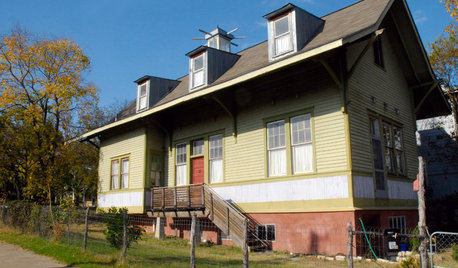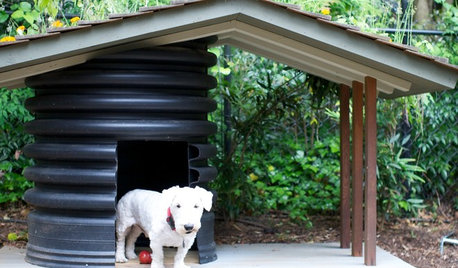HELP! Training my Donkey?
A little over a week ago I bought 4 pairs of Barbados sheep, and a jenny who lived with the flock. The man who sold me the animals said that he would take the donkey back if she wasn't happy here (she had 2 other donks to hang with at his place), or if I found that she was too much of a handful.
Her first day here, Petunia followed me around like a puppy craving attention. I gave her treats to encourage her to bond with me. The second day, she acted completely miserable; wouldn't even take a cake from me. I talked it over with her previous owner, and we decided to give her a week or two and see if she adjusted. I learned that the donkeys really weren't "part of the flock" at his place, due a large and ill-tempered ram who didn't want them around.
At this point, Petunia seems to be adjusting to hanging with the sheep pretty well, and the ewes and lambs accept her. She got over her 2nd day snit. From time to time she will chase the sheep a bit, but it appears playful, and the sheep often follow her around, too.
The problem is, she is fast becoming a spoiled brat! She never had nearly as much human interaction as she gets here. At this point, she is so pushy with me whenever I have a bucket of corn in my hand, I'm becoming afraid of getting hurt! When I shift the bucket to my other hand to keep it away from her (after throwing some off in another direction in an attempt to distract her), she circles me, gets her head under the bucket and tries to knock it out of my hand. I've also seen her kick at the sheep a bit when she wants control of the corn I've thrown on the ground to lead the sheep into their shed at night. I am relieved to note that she doesn't kick them HARD, however. Just kind of like a sharp nudge, and they move away without any indication that they are hurt.
I know enough about animals in general to realize that I must keep the upper hand with her or I'll be lost! But how do I do that? I think it might help if I put a halter on her, but she's never worn one before. Is she likely to object violently to having it put on her? Also, is it okay to leave it on her all the time, or would it wear sores on her head?
I really enjoy her and want to keep her. But, obviously, I need to learn the correct way to discipline a donkey! I'm beginning to think maybe bribing her with cakes wasn't a good start. She's a greedy ol' thang!
Comments (13)
msmitoagain
15 years agolast modified: 9 years agoWe have horses. It takes time to halter train any animal. But, I do suggest that you take the time to do it. There will probably be some time when you need to get immediate control of her and put a halter on her and lead her somewhere.
Do not leave a halter on her all the time. There have been too many horror stories with horses dieing or suffering injuries due to them being left on the animal.
Until you get her halter broke, you could try using a short crop/whip to move her away from you when you enter the pasture. You might want to practice by carrying an empty bucket and the crop to start training her.
Another thought that comes to mind is placing a ground feeder near your pasture entry point and feeding her in it. After we started building our house and the horses old barn was taken away from them, because it was in the house site area, we used ground feeders. We have 6 horses and they all had their pecking order. Believe me horses are just as greedy when it comes to feeding. After the order was established they learned to go to their own feeding area and wait for us to get there.
We fed from ground feeders until we got our new barn built. They learned that was where the food was going, so they knew that's were they needed to go and wait.
Hope this helps.
Here is a link that might be useful: MY BLOG
nhsuzanne
15 years agolast modified: 9 years agoI would not under estimate how lonely she might be for her own kind or other animals that she was attached to. Donkeys are incredibly sensitive this way believe it or not.
I have had donkeys for 23 years. My elder girl literally mourned the passing of her old pasture mate of 20 years and it was awful. I wish you could have two donkeys it would be better for everyone!
Good luck and be patient with her.
Related Professionals
Vernon Hills Landscape Architects & Landscape Designers · Alamo Landscape Contractors · Caldwell Landscape Contractors · Fairhope Landscape Contractors · Fort Wayne Landscape Contractors · Huntington Landscape Contractors · Lebanon Landscape Contractors · St. Louis Landscape Contractors · Reisterstown Landscape Contractors · Columbia Fence Contractors · Hammond Fence Contractors · Plainfield Fence Contractors · Tavares Fence Contractors · Gulf Gate Estates Tree Services · Crystal Lake Decks, Patios & Outdoor Enclosureshenhilton
Original Author15 years agolast modified: 9 years agoThank you for the responses!
msmitoagain, when you say to use the crop to "move her away" do you mean just push, maybe tap on her, and direct her with it? I don't feel that hitting or whipping any animal is ever a good solution. Admittedly, I have no experience with equines. But if I would need to whip her make her behave in a manner I can cope with, I'll let her go back to her old home, where this isn't an issue.
nhsuzanne, I have no doubt she misses her old pals! And I didn't realize at the time I took her that the sheep really weren't who she was accustomed to hanging around with. But she does seem to me to be adjusting, making friendly overtures to the sheep, our dogs, even the chickens. And she definitely wants my attention whenever I'm outside. She comes to fence and brays at me. If that depression of the 2nd day had continued, she would already be back "home!"
So I do dare to hope she'll be happy with the available companions here. She seems quite set on the path of being the spoiled only donkey. (I selected her because she was the most human-oriented of the 3, and acted very gentle.) My biggest concern now is not to form bad habits at the start which will be hard to break later, as her self-confidence increases. She's a big animal, and I can't let her push me around. (And, yes, I am generally a push-over for animals.) Unfortunately, a second donk isn't in the cards right now.
What do y'all think about her kicking at the sheep? Just normal donkey behavior? I almost came unglued the first time I saw it, but then when I observed that she didn't seem to be hurting them, I relaxed some.
goodhors
15 years agolast modified: 9 years agoKicking is equine behaviour for keeping or moving up in their herd enviornment. If others are wary of her, she doesn't have to work hard to be the boss.
She sounds like she has no training at all, and is going to shortly be in charge of you as well. You have to decide if you will accept being pushed around or not. If not, you need to take a firm line that she is not allowed to cross, because she IS BIGGER and stronger than you are. She can't be allowed even an inch of leeway, you backing off in your limits to her, because in the herd that makes her dominant to you. Donkey will learn VERY quickly that you are just bluffing, and will ignore your "personal space" herding you as she likes.
I use a whip, stick about 5ft long to extend your reach, give you more safety space around your body. Equines bite and kick, hit bodies, to enforce their "personal space" as herd leaders. You moving away, makes her win. Whip is your "kick and bite" part of enforcement of your rules. I use it in herd situations, gains me space, keeps horses back out of reach to hurt me. There is always much communication in a group of horses that people never see. Ears flopping, lips opening, threats, going on with the horses to enforce their herd standing.
Donkey needs to back away from you with your "mean ears face" that the lead horse gives lower animals. Sometimes it might take a whack or two, out of her kick range with the long whip stick, as you give directions, before she accepts that space is YOUR space, she is not welcome. Whip touches at first, keeps you out of her reach, yet you can touch her as enforcment to get away from you! Herd dynamics are not always nice and fuzzy, not a storybook setting. Doesn't start with whaling on her, just some sharp flicks with whip tip, as you discourage her approach to your body and bucket. We give a hiss noise, as warning to back away. Always hiss to back them up or warn them away. They get flicked if they ignore my space and the hiss. Discipline still is not as harsh as many herd leader gives the disobedient horse.
I think you need to get some handling on her with a halter and rope. Much easier to teach her that way, than loose in a pasture. You can try haltering her, I would advise a buckle type that goes behind her ears. At this point a pull-on halter would probably not work because you have to handle her ears to get it on. She needs to lead with the rope, stop, back up some at the hiss signal, stand quietly to be tied for a while, to be considered as somewhat trained. There are books, tapes, if you want to try the training yourself. You don't say how big she is. Even a little donkey packs a whollop, so they need to be civilized for people to handle. They are not stupid, but may not understand what you are showing them. Not stubborn, but may be slow to cooperate if they don't really understand. I know a number of very nicely trained donkeys, but it takes determination on trainer's part, no anger, lots of repeating the steps. Treats are very sparing if used at all. They need to obey because you want it, not only if there is food.
Donkeys need very little feed or rich pasture to look very nice. Grain is bad for them, they get fat on little to nothing for food. Fat animals get hoof problems, laminitus or grass founder, much easier than trim or thin animals. Once they have had laminitus, they usually should not ever be allowed free grazing again, to prevent another incident.
A couple kernels of corn a day is ALL she should have. More is NOT good for her, plus the treats make her more aggressive to try getting them. She WILL push the sheep aside, taking their portion too. A creep feeder or sheep size gate to an area she can not access, could get the sheep apart from her to feed and catch. You would not have to go into the field with grain, because she is going to come for the grain and TAKE IT, if you don't require her to stand back with your whip.
At this point, reading what you have said, I would send her back to prevent getting stuck with her. She is untrained, YOU are untrained about donkey thinking. I forsee her winning "herd leadership" because you will not require her to behave as needed to modify her actions. You have to be VERY FIRM and CONSISTANT in your training actions. A horse person could probably help some, but donkey does not think like a horse, needs special training. A young donkey is easily spoiled, acts badly because you don't know you are treating her wrongly, encouraging bad actions from her. People get hurt doing that!
nhsuzanne
15 years agolast modified: 9 years agoFirst of all, donkeys like all equines are herd animals are happiest spending time with their own kind. Yes, they adjust but not immediately. Imagine if you were taken away from your humans and forced to live with gorillas...you get my point.
My donkeys live with two sometimes obnoxious pygmy goats (who are quite attached to the donkeys) Sometimes they give a little threat to kick just to keep them in line. I have never seen them hurt one of them. You don't have to be mean to establish yourself as boss mare or Jenny you need to be consistent. It's kind of tough if you have no experience working with equines. Donkeys are highly intelligent and like to show you this all the time.
I urge you to go back to the breeder and discuss things you can do. This donkey does not sound like she is mean spirited but she is smart enough to know that she can take advantage of you. I would not use a whip or anything threatening on her. Once the trust between human and donkey are broken it's very hard to fix. I know this from rescuing donkeys.
The best piece of advice I can give you is to not let her into your personal space especially when you have food. Tell her back or wait or something......again, her original owner may have alot of good advice for you.
I will try to find a good website that may help you understand the donkey mind - and they do have one. One of things I find most often misunderstood is when people say donkeys are stubborn. I find that a donkey will get stubborn if it doesn't understand what you are asking of it or if it is afraid.
You sound like a very kind person and you just need a little bit of experience handling this donkey. If you can over come these issues you will have a wonderful friend for life.
Good luck and hopefully you will get insight from other donkey owners here!
nhsuzanne
15 years agolast modified: 9 years agoHen Hilton - here is a place to start
Here is a link that might be useful: Donkey Training
henhilton
Original Author15 years agolast modified: 9 years agoThank you both so much! This is the sort of specific information I was looking for. I know from my work with dogs that leadership must be established or the whole relationship goes south very quickly. I was just clueless as to how one establishes leadership with a donkey. An unmanageable animal of any kind is a danger to itself and the people around it. Knowing little about chickens, I made some grave errors with my rooster, which we both have to live with now. So I figured asking for help with donkey before we get set into a bad pattern would be wiser.
I do want to keep Petunia, as long as she isn't going to be miserable here. I'm certain I can step up to the plate and get her trained, now that I have some tips on how to start. She's certainly highly intelligent, affectionate, and quite the hambone, to boot. I'm pretty sure nobody has ever worked with her before. She and the other donks at her last place just wandered several hundred acres without a whole lot of regular human contact. The person I bought her from isn't a breeder; he just sort of 'ended up' with 3 donkeys. So he has no advice for me, just an offer to take her back if it doesn't work out.
I will certainly cut out her access to corn. Thanks for the heads-up, goodhors. Her former owner cautioned me against giving her more than 2 or 3 cakes a day, already. And she is obviously VERY motivated by food, but I don't want to make her fat. Also, letting her see me as a supplier of food upon her demand isn't helping matters any.
I will get her a halter and start working with her. I hope to work up to being able to groom her, too. I know that will take lots of patience, since she has probably never even seen a brush before! But she really enjoys being scratched and petted, so I imagine we'll get there.
Many thanks for the reassurance that she won't likely hurt the sheep, nhsuzanne. That has been a big concern ever since the first time I saw her kick at them. It amazes me how she seems to know exactly where the critter she's kicking at is standing. And she really just sort of taps them with her hoof. And then, of course, they do move. So I guess she won't feel any need to increase the force, as a little tap does the job.
I'm off to check out that website now! Eager to get started. Oh . . . one more stupid question. Do I need to measure her head in order to get a halter that will fit properly? If so, where would I take those measurements? She's a fairly small donkey - her shoulder only comes up to about my chest. So a regular horse halter would certainly be too big.
henhilton
Original Author15 years agolast modified: 9 years agoJust had to pop back in and say THANK YOU so much, nhsuzanne. That website is wonderful. I love her approach. I can DO this! I'm thinking Petunia and I will do the happily ever after thing, after all.
goodhors
15 years agolast modified: 9 years agoIt would probably be best to measure if possible. Donkey tends to have a larger nose than horse of the same height. You want halter fitting nicely, not baggy loose or real snug. A cotton rope to lead with, will probably be easier on your hands if she pulls.
A note of interest, is that horse feed and sheep feed, should not be used between species. Horse feed mixes and mineral blocks contain copper, which is needed by equines. Sheep can not tolerate copper, should not have access to it. Sheep feed you purchase, has things that equines should not be allowed to eat. Sheep need plain white salt, or minerals with NO copper. So don't let the wrong animal eat the other animals feed. This would be why a sheep feeding area that donkey cannot get into, might be something to consider.
Just feeding plain corn and oats to each animal is acceptable, but they each need the minerals too. A mineral block up high on the shed wall for donkey could work, with sheep minerals in the sheep ONLY feeding area so donkey can't get in there. Donkey is big enough that a sheep size gate hole, will probably keep her out if it is solidly built above for height.
Donkey will need yearly vaccinations, which you can purchase and give yourself, to save money. Recommended are Rabies, Tetnus, West Nile for sure. She may need two shots to start, if she has never been immunized. Then just a booster yearly. We give the three Es, WEE, VEE, EEE, flu and killed Strangles. Flu and Strangles usually come from contact with other Equines, that she may not have. The Es are fly, mosquito transported, and do pop up occasionally, especially in Florida, southern states. People can get the Encephylitus, though not common, so I always vaccinate for it. Kid down the road got it from an unvaccinated pony, died, though that was many years ago.
She may need hoof care, if she can't wear them off on rough ground, covering lots of distances. As she advances in training, you can try working with her, picking hooves up daily as part of grooming routine. Still, some kindly donkeys are BAD about hooves, have to be sedated and tied, to be safe for a Farrier to trim them. Our local sheep folks got BLM donkeys for herd protection, always get them sedated for their twice a year trim. I know a Vet who got his scalp peeled, 30 stitches, because donkey was not sedated enough. They are REALLY flexible, and DO KNOW EXACTLY how hard to kick, where to aim for. Vet was up by the shoulder, leaning to get a front hoof. Little donkey, but DID NOT want him touching her after the first shot, so she nailed him.
Donkey should LOVE getting groomed as she learns how much fun it is. With her rough coat, the coarser, stiff bristles seem to be a popular choice with donkeys. Bristles get right to the skin. They also like the round rubber Grooma curry brushes. Lean into it, they lean back, seem to enjoy it immensely. I go lightly on ear brushing, but try to accustom them to ear touching, make it enjoyable. Brushing chest, belly, girth area if safe.
Some people put up stiff floor broom heads on a sturdy post, so donkey or horse can rub against it themselves. Donkeys seem to ALWAYS like getting itched, will create a rolling spot. A load of sand dumped in the paddock or pasture, will put her in donkey heaven, and you can call it the A** Hole!
Around here the gnats always congregate in equine ears, make them scabby. I rub inside lightly with vasaline every few days to keep the blood suckers out. Animals get to liking ears rubbed and cleaned of insects. Chest area, bellybutton areas also get chewed, so I vasaline them too. BE CAREFUL to see if she is accepting of being touched there, don't get hurt. She can kick forward of her shoulder point, and sweep backward, covers a LOT of area. Standing close to her body, you won't get the full impact power, so think of that too. Maybe your area doesn't get the gnats so she won't be bothered. Some Southern folks say their donkey get lower legs chewed by flies and bugs. Have to keep it greased with stuff to close the sores that get created. Every area has it's problems.
Getting your ground training done, should help the respect in many ways. We use the hiss, it is a special noise, horses know what hiss means. I carry the whip, they give me space with it, as they congregate in a group to come in, follow me around the field checking fence, checking me for treats or head rubs, see if they can go for a ride. Avoiding each other, they might forget to pay attention to me as they clown around. I need that space for my safety.
A whip is an aid, you extend your reach with it, to keep out of kick or bite range. You can use it to tap one end of horse over, keeping the other end in place. Same with donkey or mule, tap them to move away from whip touch. Flick is not severe, but next step if one is crowding, ignoring your directions. Donkeys and mules are not dumb, but they don't think as we expect them to in reactions. So trying to ignore directions or outwait you, see if you give in and forget about direction, is one of their methods. Waiting on the donkey to respond, is the reward for them being slow. Pretty soon donkey thinks that you EXPECT to give direction 3 times before discipline. That IS HOW you have now trained her. Kind of like kids! I have not seen them hold a grudge or loose trust with whip tapping, making them respect your spaces. Lead herd animal make them respect her! No respect is when you allow them to push you around, create a monster with no manners.
Glad you have dog training, it helps you see herd dynamics. Web sites can be very helpful in spreading information.
jennybog
15 years agolast modified: 9 years agoI have Two Mini Donkeys. They are herding animals yes, but they like there own.They are guardian animals. Most people will only sell two, for they get very lonely. Check out donkey talk magazine . Everything you need to know and then some. They need their hoofs done every 6 to 8 weeks. Find a farrier that knows the diffarence between horse hoofs and donkey's. Worming is very important. Go to the feed store they are a wealth of info. Good luck and ENJOY!!!! we love our donkeys
henhilton
Original Author15 years agolast modified: 9 years agoI had thought about the need for a farrier. Her old ranch has much rockier (limestone) ground than our grassy pasture. Her hooves look pretty good now, but I doubt they'll stay that way. Good to know that just a regular horse farrier won't necessarily serve. I have friends up the road with horses, and had just planned to use the same guy they use. I'll have to talk to him.
Today I got a sheep/goat mineral block and a salt block that says its "sulphurized." (Is that okay for everybody?) Haven't put either one in the pasture yet. I know about the problem with copper for sheep, but is there anything in their mineral block that would actually hurt the donk to have? Good idea, to mount her block higher! Until we get a separate pen built, tho, she would have access to the sheep block, if I put it out now.
I figure I'll contact the vet soon to see about what vaccs everybody needs. Trying to let them settle in and get comfortable with me before I subject the dr. to a bunch of hinky, frightened animals.
I discovered today that the flies around the ankles are a problem. I got a rubber curry brush and started working on donk some, only to discover they were biting my ankles like crazy. Looked down, and saw they were all over hers, too. Vaseline for the ears sounds like that may be a much better idea than fly spray (which doesn't really seem to work for my neighbors' horses, anyway).
The brushing went well - she made it clear she enjoyed it. But I just did her neck, back and sides for starters. I quit when she seemed to be getting restless. Thanks for the heads-up about the kick range! Ya know, as I was standing there brushing her, it occured to me to wonder if she could kick forward. She wasn't too keen on the halter, but didn't really spook about it. I believe we'll get there. Again, I quit while we were ahead. Brushed a bit more and then left the pasture while she was behaving nicely.
Thanks again for all the info, everyone!
















henhiltonOriginal Author